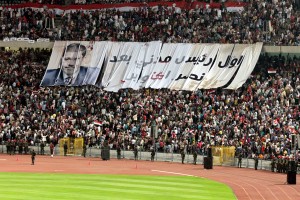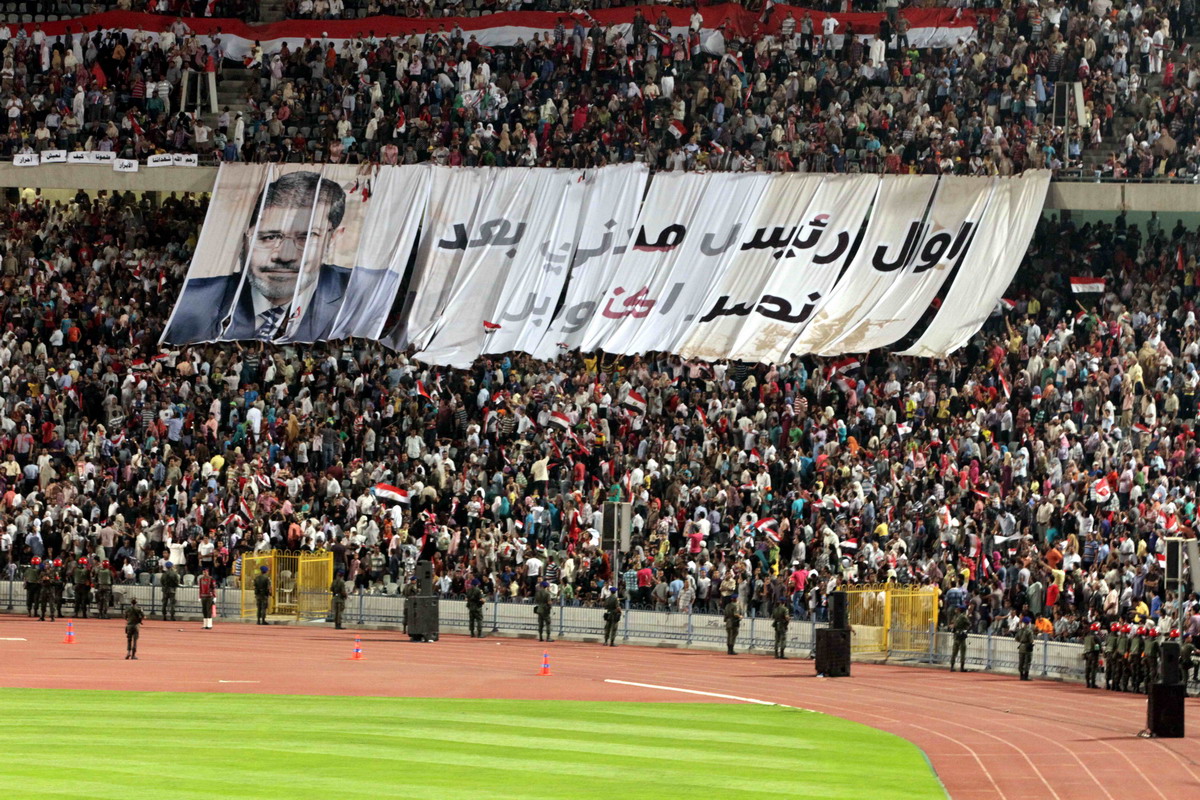
Mohamed Omar
Morsy in the stadium ceremony and Qandil
Celebrations were held yesterday commemorating the 39th anniversary of Egypt’s 1973 war against Israel.
In Cairo, thousands gathered at the Cairo International Stadium where President Mohamed Morsy spoke for nearly two hours.
“We are revolutionaries, we are free and we are carrying on the struggle,” he told a cheering crowd, mirroring a chant famously used by protesters in Tahrir Square.
Morsy said of 6 October 1973, When Egypt crossed the Suez Canal and destroyed the Bar Lev line, “it returned to Egypt not only the land, but also glory and dignity.”
The president said the 25 January revolution had stopped the use of the memory of the October war for the private benefit of some individuals. During last year’s uprising, he said, the army and people were one hand, again standing up to corruption, forged elections and the manipulation of the spirit of the October war.
Just like he was committed to those who made sacrifices in the 1973 War, the president said a fact finding committee is currently trying to restore the full rights to those who made sacrifices during the revolution.
“After the revolution, which was always protected by God, we went through a rough phase… then there were the parliamentary elections followed by the presidential elections,” Morsy said describing the presidential elections as a rightful expression of the will of the people.
Morsy described the day the army handed power to civilian rule on 30 June, as the third passage. “We’ve taken the first steps and we are heading towards more stability, security, justice, renaissance, and social justice…towards a New Egypt,” he said.
In reference to his promises made for his first 100 days in office, Morsy said, “we have plenty of resources that have been wasted because of mismanagement, the lack of an aware leadership, and because we were trying to move on but the corruption was too much.”
“I take full responsibility for it, with you and before you,” Morsy said. The fives axes of his programme were discussed in detail. Morsy claimed he had achieved 70 per cent of his promises related to security. He saluted what he described as the “men of the Interior [Ministry]” for their efforts.
In regards to fuel, he said that the needs of butane gas have been fullfiled by 85 per cent and “we are in pain over the 15 per cent shortage but there are reasons for it. We are not escaping the responsibility though,” he added. Among the reasons he gave was corruption and the smuggling of fuel.
He added that a large part of the problem is that fuel subsidies are not reaching the people who deserve them. He said that those who can afford benzene 95 should pay for it without the subsidy.
Around 40 per cent of the goals related to cleanliness have been achieved and that so far, according to Morsy. Over 600,000 tons of garbage have been removed from the Greater Cairo region, 200,000 tons form Alexandria and 350,000 from other governorates, he said. With regards to bread and improving its quality, the president said that “around 80 per cent of the goals have been achieved,” adding that the quality still needs to be improved in other regions.
Finally, Morsy said that 60 per cent of the goals in traffic have been achieved, adding that the people may have noticed that traffic police can now be seen on the roads.
The political implications of the war and treaty
The 1973 war saw Egypt and Syria respectively fighting to gain the Sinai and Golan Heights back from Israel. The war was followed by a ceasefire and eventually, through a long negotiation process, Egypt and Israeli signed the Camp David Accords in 1978, which led to the signing of the peace treaty in 1979. While the peace treaty secured Israel’s withdrawal from Sinai, it also implemented the normalisation of relations between Egypt and Israel, which remained a thorny issue between Egypt and other Arab states for years to follow.
Over 30 years after the treaty, it remains a controversial topic in Egypt, “especially after the Islamists have come to power,” said Said Okasha, an Israel expert in the Ahram Centre for Political and Strategic Studies. “It is known historically that they opposed the treaty but they are no longer in the opposition, they are now in power. They are obliged to respect international treaties but the Islamists want to see changes made to the treaty.”
Morsy has to remain committed to the treaty in Okasha’s view. He therefore, does not expect any drastic change in Egypt-Israeli relations or in the way Egypt has dealt with the Gaza blockade. Morsy stressed in his Saturday address his commitment to Gaza however.
“The internal situation in Egypt doesn’t allow it. It doesn’t allow Morsy to gamble at this point, so he will have to remain committed [in his foreign policy] because he doesn’t want to upset the US so that it doesn’t stop supporting the Muslim Brotherhood,” Okasha said.
To commemorate the date, Morsy decided to release 569 prisoners across the country, according to MENA. It is not clear yet whether these are political or criminal detainees. Thousands of political prisoners remain incarcerated following the 25 January revolution. Many were hoping that Morsy, who pledged to release them in his first speech as president, would do so. He subsequently formed a special committee to review their cases and have them released.
Morsy claimed during his address that most of the arrested during the revolution have been released and more will be released soon.
